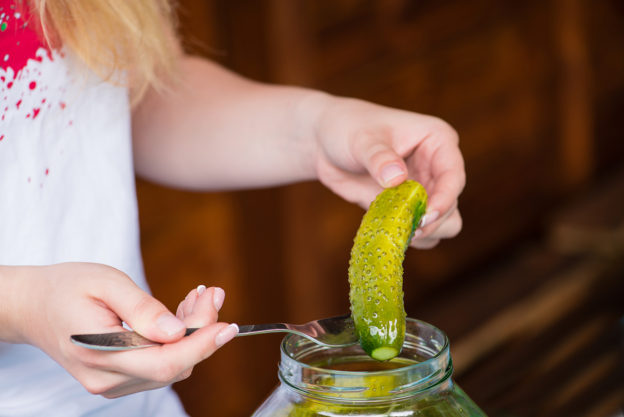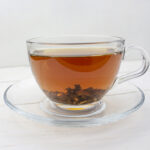By David Blyweiss, M.D., Advanced Natural Wellness
December 28, 2018
Although I often recommend that patients take a probiotic supplement, there is nothing better for your gut health than eating fermented foods.
These foods contain probiotics that support a healthy gut, boost the nutritional value of foods and help you absorb those nutrients better.
Eating fermented foods on a regular basis supports immune response, weight management, cardiovascular health, glucose and insulin metabolism, boosts mood and can even help reduce muscle soreness after workouts.
With all of that great news I recommend that everyone, including you, get more fermented foods in their diet. (You can make it a New Years’ Resolution for 2019!)
When I mention this to patients, many of them swear up and down they get plenty of fermented foods.
Some say they eat pickles. Others claim they love sauerkraut. And the larger majority declares they eat yogurt regularly. So I ask them…
MD Exposes the Hidden Danger to Your Eyes

When your eyesight starts to fail, it's a real problem. Suddenly you can't go to the grocery store... you can't get to the doctor if you have an emergency... you can't meet your friends for dinner…
Your "regular" doctor doesn't have time to keep up with the latest research. And the same goes for eye doctors. They go to school to learn how to fit you for glasses and contacts, but have no way of preventing the damage and loss of eyesight that threatens your freedom and independence.
Let me show you something that explains a LOT about how your eyes work.
In my FREE Special Report, I'll show you a HUGE, untapped resource for your eyes that safely and naturally restores clear, effortless eyesight.
Click here to get started...
“What kind of pickles do you eat?”
The responses are varied. Claussen, Vlassic, Boar’s Head… sometimes it’s just “the ones that come in a jar.”
Sadly, these types of pickles are nothing like the old-fashioned dills your grandparents and great-grandparents bought at the general store. Instead of being fermented, they’re pickled in vinegar.
Both of these methods preserve pickles, but the ones packed in vinegar have been sterilized. They have no life left in them. They’re dead pickles!
Pickles that are fermented, on the other hand, are teeming with living bacteria that nourish and protect your gut microbiome.
If you check out the pickles in the refrigerated section, that’s where you’ll find the ones that are fermented. The label should clearly state that they are naturally fermented and cured, and they should contain no vinegar or preservatives.
“What kind of sauerkraut do you buy?’
The answers are a little more creative here. They range from jarred, canned, Bavarian style, the organic kind and even “the one in the bag”.
Well there’s a funny thing about these commercial types of sauerkraut. While it’s true that they’re fermented and initially contain live probiotic bacteria, all of them get pasteurized at high heat before packaging.
And guess what this high heat processing does to all of those gut-loving bacteria that are so good for you? It kills them!
The World's Quickest Solution for Ending Prostate and Urinary Misery
This has recently been revealed to be one of the only real breakthroughs in prostate health.
The seeds of a strange fruit (sometimes called "Chinese Apples") hold powerful phytonutrients that are a revolution in prostate health.
In fact, UCLA and Veterans Administration research have now proved this to be true.
Not only that, but it may be the worlds quickest solution for ending prostate misery.
Simply stated, these phytonutrients represent a huge step beyond beta sitosterol, saw palmetto, and other phytosterols alone.
Simply click HERE if you want to have fast prostate relief...restful, uninterrupted sleep...no more constant "urges to go"...enhanced virility...and optimal prostate support for life.
When buying sauerkraut, the best kind is raw, organic fermented sauerkraut. It should remain unpasteurized and contain no vinegar. This type is generally found in the refrigerated section in health food stores. You can buy it online, too. Or try your hand at making homemade organic sauerkraut!
Delicious Fermented Foods to Try in 2019
Here in the U.S. we have a bad habit of sanitizing and sterilizing our food to the point of malnutrition.
Fermentation isn’t new. It dates back as far as 6000 B.C. And I’m excited to see it’s made a comeback in recent years.
It’s estimated that eating fermented foods can potentially increase the number of healthy microbes in your diet by up to 10,000 times. That’s what I call gut diversity! It would be like having a whole new gut microbiome.
Here are some great foods to try so that you can get more health-promoting fermented foods in your diet.
Kimchi. A spicy Korean dish made using fermented vegetables like cabbage, radishes and hot peppers. You can use it as a side dish, add it to pasta or zucchini noodles, or as a filler for wraps and pitas.
Kombucha. This is a fermented tea made by adding bacteria and yeast to tea and sugar. (Some people call it kombucha mushroom tea, but there are no mushrooms in it. Just yeast and bacteria.) My favorite is Gingerade from GTS, one bottle a day with dinner at home.
Tempeh is an Asian food made from cooked and slightly fermented soybeans. Once it’s fermented, it can be pressed into a patty or loaf, and then cooked. It’s grainier than tofu and has a nutty flavor. Like tofu, it absorbs flavor from sauces and spices.
Kefir is a fermented dairy drink that can act as a great replacement for cow’s milk. I tend to think of it as a drinkable form of yogurt with a rich source of easily digestible protein, vitamins and minerals.
Miso is another good fermented food, and pretty well known here in the U.S. since it is used in miso soup.
Natto is a popular food in Japan, but I’m not sure I would recommend it as an introduction to fermented foods. It’s basically fermented soybeans that are often topped with soy sauce, mustard or other seasonings. However, I have to admit: the smell and texture can be off-putting. So save this one for a day when you’re feeling downright adventurous.
And as far as commercial yogurts are concerned, I’ve seen some evidence that many of the probiotic dosages in them are too low to provide the health benefits shown in studies.
Sure. You can look for the “Live & Active Cultures seal” on yogurt. It guarantees that the product contained 100 million cultures per gram at the time of manufacture. However, it doesn’t guarantee that number won’t dwindle to a small fraction by the time you eat it. So it’s a crap-shoot either way.
Your safest bet is opting for an organic Greek yogurt with no added sugars or artificial flavors. Those sweet yogurts can have 10 or more teaspoonfuls of sugar in them; so not so good for you.
Picking the right fermented food for you is easy, find the ones you like and make them a part of your daily diet.
SOURCES:
Marco ML, et al. Health benefits of fermented foods: microbiota and beyond. Curr Opin Biotechnol. 2017 Apr;44:94-102.
Lang JM, et al. The microbes we eat: abundance and taxonomy of microbes consumed in a day’s worth of meals for three diet types. PeerJ. 2014 Dec 9;2:e659.
Scourboutakos MJ, et al. Mismatch between Probiotic Benefits in Trials versus Food Products. Nutrients. 2017 Apr 19;9(4).






